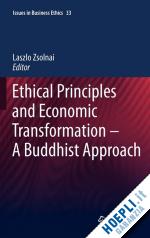
Questo prodotto usufruisce delle SPEDIZIONI GRATIS
selezionando l'opzione Corriere Veloce in fase di ordine.
Pagabile anche con Carta della cultura giovani e del merito, 18App Bonus Cultura e Carta del Docente
Buddhism points out that emphasizing individuality and promoting the greatest fulfillment of the desires of the individual conjointly lead to destruction. The book promotes the basic value-choices of Buddhism, namely happiness, peace and permanence.
Happiness research convincingly shows that not material wealth but the richness of personal relationships determines happiness. Not things, but people make people happy. Western economics tries to provide people with happiness by supplying enormous quantities of things and today’s dominating business models are based on and cultivates narrow self-centeredness.But what people need are caring relationships and generosity. Buddhist economics makes these values accessible by direct provision. Peace can be achieved in nonviolent ways. Wanting less can substantially contribute to this endeavor and make it happen more easily. Permanence, or ecological sustainability, requires a drastic cutback in the present level of consumption and production globally. This reduction should not be an inconvenient exercise of self-sacrifice. In the noble ethos of reducing suffering it can be a positive development path for humanity.
Preface.- Acknowledgement.-Introduction.- Why Buddhist Economics? Laszlo Zsolnai.- Part 1 Buddhist EthicsApplied to Economics.- The Relational Economy; Julie A. Nelson.- Buddhism andSustainable Consumption; Peter Daniels.- Economic Sufficiency and Santi Asoke; Julia Essen.- Pathways to aMindful Economy; Joel C. Magnuson.- Part 2 Achieving Happiness and Peace.- DoOur Economic Choices Make Us Happy? Colin Ash.- Gross National Happiness; SanderTideman.- The Application of Buddhist Theory andPractice in Modern Organizations; Bronwen Rees and Tamas Agocs.- Leadershipthe Buddhist Way; Laurens van den Muyzenberg.- Conclusion.- The Contributionsof Buddhist Economics; Laszlo Zsolnai. Bibliography of Buddhist Economics.- About the Authors.- Index.











Il sito utilizza cookie ed altri strumenti di tracciamento che raccolgono informazioni dal dispositivo dell’utente. Oltre ai cookie tecnici ed analitici aggregati, strettamente necessari per il funzionamento di questo sito web, previo consenso dell’utente possono essere installati cookie di profilazione e marketing e cookie dei social media. Cliccando su “Accetto tutti i cookie” saranno attivate tutte le categorie di cookie. Per accettare solo deterninate categorie di cookie, cliccare invece su “Impostazioni cookie”. Chiudendo il banner o continuando a navigare saranno installati solo cookie tecnici. Per maggiori dettagli, consultare la Cookie Policy.